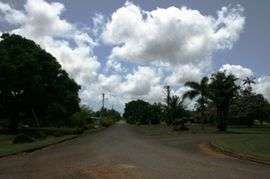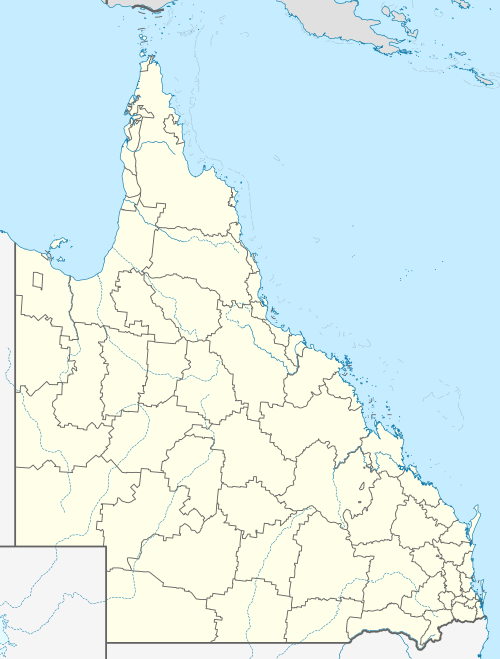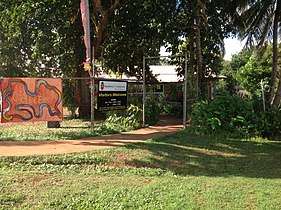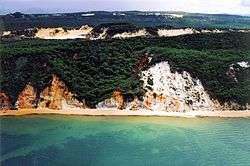Hope Vale, Queensland
Hope Vale (also known as Hopevale) is a town within the Aboriginal Shire of Hope Vale and a coastal locality split between the Aboriginal Shire of Hope Vale and the Shire of Cook, both in Queensland, Australia.[2][3][4] It is an Aboriginal community.
| Hope Vale Queensland | |||||||||||||||
|---|---|---|---|---|---|---|---|---|---|---|---|---|---|---|---|
 Hope Vale | |||||||||||||||
 Hope Vale | |||||||||||||||
| Coordinates | 15.2962°S 145.1119°E | ||||||||||||||
| Population | 974 (2011 census)[1] | ||||||||||||||
| • Density | 0.8712/km2 (2.2564/sq mi) | ||||||||||||||
| Postcode(s) | 4895 | ||||||||||||||
| Area | 1,118 km2 (431.7 sq mi) | ||||||||||||||
| LGA(s) | |||||||||||||||
| State electorate(s) | Cook | ||||||||||||||
| Federal Division(s) | Leichhardt | ||||||||||||||
| |||||||||||||||
Geography
Hope Vale is on Cape York Peninsula about 46 kilometres (29 mi) northwest of Cooktown by road, and about 10 kilometres (6.2 mi) off the Battlecamp Road that leads to Lakefield National Park and Laura.
History
Guugu Yimithirr (also known as Koko Yindjir, Gugu Yimidhirr, Guguyimidjir) is an Australian Aboriginal language of Hope Vale and the Cooktown area. The language region includes the local government area of the Aboriginal Shire of Hope Vale and the Shire of Cook, particularly the localities of Cape Bedford, Battle Camp and sections of the Normanby River and Annan River.[5]
The Cape Bedford Mission was established by Johann Flierl, a missionary of the Lutheran Church in 1886, with the settlement at Elim on the beach.

Owing to fears that the German-influenced Aboriginal people might cooperate with the advancing Japanese in World War II, the total population of 286 was evacuated south to various communities by the military in May 1942. The German Lutheran missionaries were sent to internment camps. Most of the people were sent to Woorabinda, near Rockhampton, in Queensland, where a large number reportedly perished from disease and malnutrition.[6] Hope Vale was re-established as a Lutheran mission in September 1949. Aboriginal people from the Hope Valley and Cape Bedford Missions settled there. A work crew was allowed to return in 1949 and the first families came home in 1950. Hopevale Post Office opened on 1 May 1965 and closed in 1990.[7]
Hopevale is no longer run as a mission by the church but by its own elected community council. In 1986 it received a "deed of grant in trust" (DOGIT) which "granted title to 110,000 ha of land which was previously Aboriginal Reserve Land held by the Under Secretary as trustee, to the community council to act as trustees of the land for the benefit of the residents."[8] The Aboriginal Land Act 1991 (Qld) transferred into Indigenous ownership all previous reserve land under DOGIT (Deed of Grant in Trust) titles.[9]
- "The Warra people of the Hopevale Community of Eastern Cape York Peninsula in Queensland received acknowledgement of their native title rights in December 1997. The determination recognised rights of exclusive possession, occupation use and enjoyment over 110,000 ha. (Native Title Determination, Warra Peoples, Hope Vale Community of Cape York (NNTT ref# QC96/15))"[10]
Hopevale is home to several clan groups who mostly speak Guugu Yimidhirr and other related languages, as well as English.
Due to a lack of reliable water supplies at Elim, the community was shifted about 20 kilometres (12 mi) inland to its present site.
Notable former residents of Hopevale are Queensland rugby league player Matt Bowen and lawyer and activist Noel Pearson. Pearson has criticised the level of violence in the community.[11]
On 21 July 2008 the Hope Vale community opened the Indigenous Knowledge and Technology Centre (IKTC), in the Jack Bambie building at 5 Muni Street. This centre provides a library service, training venue and public Internet access.[12] The Hope Vale community has a strong choral singing tradition since its evacuation to Woorabinda. The ensemble has performed at the Queensland Music Festival on three occasions—in 2005, 2007 and 2009.
At the 2011 census, Hopevale had a population of 974 people.[1]
See also
- Marie Yamba Aboriginal Mission, a Mission situated south of Proserpine that commenced in 1897 and finished in 1902 with 24 Aboriginals being moved to Hope Vale Mission.[13]
Footnotes
- Australian Bureau of Statistics (31 October 2012). "Hope Vale (UCL)". 2011 Census QuickStats. Retrieved 26 January 2016.

- "Hope Vale - town (entry 16117)". Queensland Place Names. Queensland Government. Retrieved 13 June 2017.
- "Hope Vale - locality in Aboriginal Shire of Hope Vale (entry 45790)". Queensland Place Names. Queensland Government. Retrieved 13 June 2017.
- "Hope Vale - locality in Shire of Cook (entry 45790)". Queensland Place Names. Queensland Government. Retrieved 13 June 2017.
-

- Hope Vale features in WWII documentary Archived 1 February 2017 at the Wayback Machine. LCA Communications, Lutheran Church of Australia, 4 April 2015
- Premier Postal History. "Post Office List". Premier Postal Auctions. Retrieved 10 May 2014.
- Pearson, N. "The Deed of Grant in Trust and Hope Vale Aboriginal Community, North Queensland". (1989) 1(38) Aboriginal Law Bulletin 12.
- "Aboriginals & Torres Strait Islanders - Legislation - Queensland". WorldLII. Archived from the original on 4 August 2008.
- Strelein, Lisa. "Mabo/Hopevale & Aboriginal Land, 1997". mabonativetitle.com. Archived from the original on 14 July 2011.
- "Noel Pearson: Vale hope in outback hellhole - Opinion - The Australian". 13 June 2007. Archived from the original on 13 June 2007. Retrieved 19 March 2018.CS1 maint: BOT: original-url status unknown (link)
- "Hope Vale (Jack Bambie Memorial Centre)". plconnect.slq.qld.gov.au. State Library of Queensland. Archived from the original on 22 January 2018. Retrieved 22 January 2018.
- "Mainland communities L-M:". slq.qld.gov.au. State Library of Queensland. Archived from the original on 19 March 2018. Retrieved 27 June 2017.
References
- Pohlner, Peter. 1986. gangarru. Hopevale Mission Board, Milton, Queensland. ISBN 1-86252-311-8
- Poland, Wilhelm. Loose leaves; reminiscences of a pioneer North Queensland Missionary. originally published as three booklets by The Mission Institute of Neuendettelsau, Bavaria, 1905-1912. Reprint: Lutheran Publishing House, Adelaide. 1988. ISBN 0-85910-468-0
- Roth, W. E. 1897. The Queensland Aborigines. 3 Vols. Reprint: Facsimile Edition, Hesperian Press, Victoria Park, W.A., 1984. ISBN 0-85905-054-8.
- Sutton, Peter (ed). Languages of Cape York: Papers presented to a Symposium organised by the Australian Institute of Aboriginal Studies. Australian Institute of Aboriginal Studies, Canberra. (1976). ISBN 0-85575-046-4.
- Wynter, Jo and Hill, John. 1991. Cape York Peninsula: Pathways to Community Economic Development. The Final Report of The Community Economic Development Projects Cook Shire. Cook Shire Council.

Further reading, listening and viewing
- Aboriginal Co-Ordinating Council Media Facility. 2002. The Woorabinda Story: 7 Years in Exile.
- Australian Broadcasting Corporation, Cairns. 20 April 2005. The Morning Show with Pat Morrish. Radio Broadcast.
- Bambie, Herman (Interviewer Deborah Somersall) (ed). 2000. Bringing Them Home Oral History Project. Hope Vale, 26 October, Oral History, TRC 5000/ 204.
- Bennett, Judy and Gordon, Wilfred. 2007. ‘Social Capital and the Indigenous Tourism Entrepreneur’. In: J. Buultjens and D. Fuller (eds) Striving for Sustainability: Case Studies in Indigenous Tourism, pp. 333–70. Lismore, NSW, Australia: Southern Cross University Press.
- Brad, Jen. 1994. Milbi Thagaalbigu Balgaayga (A Story from a Long Time Ago). Hopevale: Guugu Yimithirr Cultural Centre.
- Callaghan, Margie, editor. Mangal-Bungal Clever with Hands: Baskets and stories woven by some of the women of Hopevale, Cape York Peninsula. Hopevale Community Learning Centre Aboriginal Corporation. ISBN 978-0-646-46701-6
- Costello, David (Interviewer David Woodgate) (ed) (2000) Bringing Them Home Oral History Project. Hope Vale, 26 October, Oral History, TRC 5000/ 187.
- Deeral, Eric no date. Lest we Forget: Home at Last. Hopevale: Guugu Yimithirr Cultural Centre.
- Dekker, John. 8 June 1970. Guugu-Yimidhirr Words of Life (1). Global Recordings: catalogue number C16750, CD.
- Dekker, John. 8 June 1970. Guugu-Yimidhirr Words of Life (2). Global Recordings: catalogue number C16751, CD.
- Evans, Kay E. 1972. ‘Marie Yamba, Bloomfield and Hope Vale: The Lutheran Missions to the North Queensland Aborigines, 1886-1905’ Queensland Heritage 2.6:26-35.
- Gordon, Tulo and Haviland, John. 1980. "Milbi: Aboriginal Tales from Queensland's Endeavour River. Canberra: Australian National University Press.
- Gordon, Wilfred and Bennett, Judy (July 2007 first print no copyright) Guurbi: My Special Place.
- Grope, L. B. and Roennfeldt, Ivan. 1977. From Despair to Hope: A Brief Survey of the Hope Vale Mission from Its Establishment to the Present. Hope Vale: Hope Vale Mission.
- Hart, Roger and Jimmy (Interviewer David Woodgate) (ed). 2000. Bringing Them Home Oral History Project. Hope Vale, 26 October, Oral History, TRC 5000/193.
- Haviland, John and Haviland, Leslie. 1980. '"How much Food will there be in Heaven?" Lutherans and Aborigines around Cooktown to 1900.' Aboriginal History 4.2:118-49.
- Haviland, John Beard. 1985. ‘The Life History of a Speech Community: Guugu Yimidhirr at Hopevale’ Aboriginal History 9.2/1:170-209.
- Haviland, John Beard. 1988. Guugu Yimithirr Word List. Reed College.
- Haviland, John B. 1990. "’That was the Last Time I Seen Them, and No More": Voices Through Time in Australian Aboriginal Autobiography’. American Ethnology 18.2: 331-61.
- Haviland, John B., with Hart, Roger. 1998. Old Man Fog and the Last Aborigines of Barrow Point. Crawford House Publishing, Bathurst. ISBN 1-86333-169-7.
- Jack, Walter (Interviewer David Woodgate) (ed). 2000. Bringing Them Home Oral History Project. Hope Vale, 26 October, Oral History, TRC 5000/192.
- Kernich, E.C. 1958. ‘Hopevale Mission: Church Dedication’. The Lutheran Herald, 12 July, pp 204–05.
- Lohe, Paul. 1977. ‘Focus on Hopevale’. The Lutheran 11.16:14-15.
- Loos, Noel A. 1975. ‘A Conflict of Faiths: Aboriginal Reaction to the First Missionaries in North Queensland’ in Noel Loos (ed) Lectures on North Queensland History: Second Series, pp. 47–55. Townsville: James Cook University of North Queensland.
- McIvor, Roy (2010). Cockatoo: My Life in Cape York. Stories and Art. Roy McIvor. Magabala Books. Broome, Western Australia. ISBN 978-1-921248-22-1.
- Pearson, Noel. 2009. Up from the mission. Selected writings Melbourne: Black Inc. ISBN 978-1-86395-428-0 (pbk.)
- Pearson, Noel. 1986. "Ngamu-ngaadyarr, Muuri-bunggaga and Midha Mini". In: Guugu Yimidhirr History (Dingoes, Sheep and Mr Muni in Guugu Yimidhirr History). Hope Vale Lutheran Mission 1900-1950. Unpublished BA Dissertation, History Department University of Sydney, Australia.
- Powell, Fiona. 2002. ‘Transformations in Guugu Yimithirr Kinship Terminology’. Anthropological Forum 12.2:177-92.
- Richards, Jonathan, 2012.‘What a howl there would be if some of our folk were so treated by an enemy’: The evacuation of Aboriginal people from Cape Bedford Mission, 1942 in Aboriginal History, 36, pp. 67 – 98, http://epress.anu.edu.au?p=224611.
- Roennfeldt, I.L. 1959. ‘Board Members go North’. The Lutheran Herald, 24 October. p. 319.
- Rose, Gordon. 1978. ‘The Heart of a Man: A Biography of Missionary G.H. Schwarz’. Yearbook of the Lutheran Church of Australia, pp. 26–68.
- Rosendale, George, trans. 1986. Gunbu Guugu Yimithirrbi. Hopevale: Hopevale Lutheran Congregation.
- Rosendale, Len (Interviewer David Woodgate) (ed). 2000. Bringing Them Home Oral History Project. Hope Vale, 25 October, Oral History, TRC 5000/194.
- Roth, Walter E. 1909. "On Certain Initiation ceremonies". North Queensland Ethnography 12:166-85.
- Swijghuisen Reigersberg, Muriel E. 2013. 'Christian Choral Singing in Aboriginal Australia: Gendered Absence, Emotion and Place' in Fiona Magowan and Louise Wrazen (eds) Performing Gender, Place. and Emotion, pp. 85 – 108. University of Rochester Press. ISBN 978-1-58046-464-2.
- Swijghuisen Reigersberg, Muriel E. 2012.‘We are Lutherans from Germany’: Music, language, social history and change in Hopevale' in Aboriginal History, 36, pp. 99 – 117, http://epress.anu.edu.au?p=224611
- Swijghuisen Reigersberg, Muriel E. 2011.‘Research Ethics, Positive and Negative Impact and working in an Indigenous Australian Context’ in Ethnomusicology Forum, 20(2), pp. 255–262. (Refers to fieldwork undertaken in Hopevale) doi:10.1080/17411912.2011.596655.
- Swijghuisen Reigersberg, Muriel E. 2010. ‘Applied Ethnomusicology, Music Therapy and Ethnographically Informed Choral Education: The Merging of Disciplines during a Case Study in Hopevale, Northern Queensland’ in Applied Ethnomusicology: Historical and Contemporary Approaches, Klisala Harrison, Elizabeth Mackinlay, Svanibor Pettan (eds) Newcastle upon Tyne: Cambridge Scholars Publishing, pp. 51 – 75. ISBN 978-1-4438-2425-5.
- Swijghuisen Reigersberg, Muriel E. 2008. "Choral singing and the construction of Australian Aboriginal Identities: an applied ethnomusicological study in Hopevale, Northern Queensland, Australia." Unpublished thesis. School of Arts, Roehampton University, University of Surrey, London, UK.
- Thompson, Rev. David (ed). 2004. Milbi Dabaar: A Resource Book. Cairns: Wontulp-Bi-Buya College.
- de Zwaan, Jan D. 1966. George Bowen, and McIvor, Paddy and Jacko, Billy and Gibson, Archie and Wilson, Baru and Mulgal, Maud, and Gordon, Mary Jane. Lexical and Grammatical Elicitation of Gugu Yimidhirr and Songs. Hope Vale, Field Recording: Language Elicitation and Songs, Archive AIATSIS 01085.
- de Zwaan, Jan D. 1969. "The Preliminary Analysis of Gogo-Yimidjir: A Study of the Structure of the Primary Dialect of the Aboriginal Language Spoken at the Hopevale Mission in North Queensland." Australian Aboriginal Studies 16.5
"Out of the Shadows" a video produced by David Woodgate for the Lutheran Church, asking, Aboriginal Lutherans what they wanted from reconciliation.
External links
- "A War of Hope" (2015). A 52-minute documentary on the life of Elder and artist, Roy McIvor, telling of the cruel forced removal of the Cape Bedford Mission Aboriginal people in 1942, their return in 1949 - a story of great suffering and reconciliation
- Aboriginal Co-ordinating Council website.
- Queensland Stories - Hope Vale Water at the Library of Congress Web Archives (archived 3 July 2009)
- Queensland Stories - Hope Vale's War at the Library of Congress Web Archives (archived 3 July 2009)
- University of Queensland: Queensland Places: Hope Vale Aboriginal Shire Council
- State Library of Queensland, John Oxley Library Blog, 2009. Queensland Stories - Three new digital stories
- State Library of Queensland, John Oxley Library Blog, 2017. 75th Anniversary of the Hope Valley Evacuation